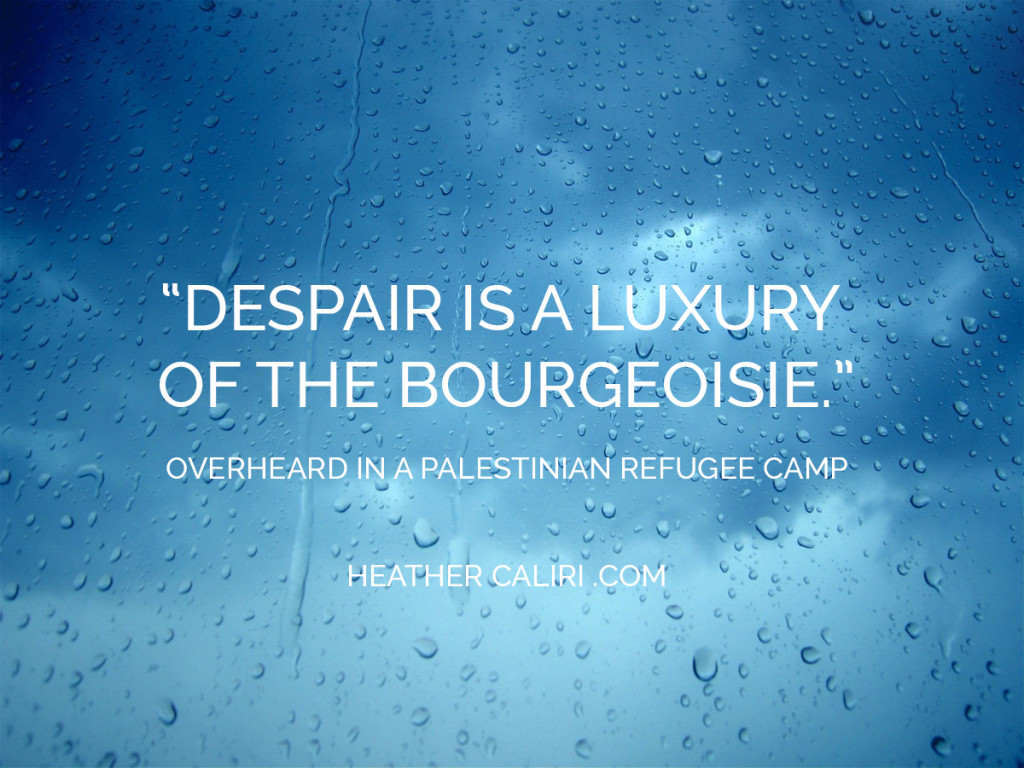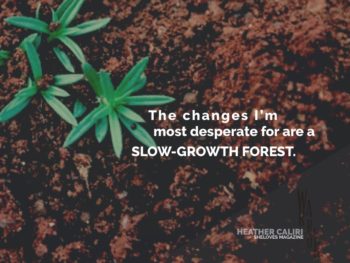
One of the biggest surprises of facing a lot of my doubts about faith is realizing that when I dig down to the root of Christian theology, I agree, wholeheartedly, with so much of it. In fact, Jesus’ words about suffering and how to find freedom, have truly released me from prison.
So I thought it was worth doing a series on beliefs I used to wish weren’t true—but now find life-giving. We’re starting with suffering and bitterness today. Go here to see the whole series.
The other day, I was chatting online with my friend Tammy, who is also the editor-in-chief of The Mudroom. I’ve not met her in-person yet, but she’s a real friend now after sharing our stories and collaborating on this big wonderful mess we make on the Internet.
Anyway, Tammy was having trouble sleeping, and I asked her why. She told me she suffers from chronic pain.
That pissed me off. Not at Tammy. At God.
Look, Tammy’s story is already full of pain, and not just the physical kind. She was in the foster care system. She was born into a family of alcoholics. She has suffered sexual abuse. She suffered a miscarriage, and then she birthed a child with significant disabilities.
I mean, it’s a bit too much, right? Should she really have to deal with physical pain on top of everything else?
But I didn’t feel angry because Tammy’s story surprised me. No, I was absolutely unsurprised.
See, a lot of people I love have stories like these. Abandonment + abuse + physical pain. Kicked in the teeth as a kid, and then kicked in the gut by adulthood, and then their bodies turn on them to finish them off.
Whole people groups deal with this too. African Americans in the US had to deal with slavery, then Jim Crow, and now they have to deal with the narcissistic gas-lighting of white people. As if that weren’t enough, they get lead poisoning in Flint because of institutionalized neglect and contempt. Or shot by the police everywhere.
Really?
The more I get brave about telling my story, the more I hear stories that hurt. People who have suffered unimaginably, over and over and over. The world does awful things to the human heart. Suffering is cheap, and the supply is plentiful.
And honestly, I would not blame people who suffer like this for turning bitter.
It would be so natural, wouldn’t it? No one could blame those who suffer like this for having serrated insides.
Except—
Except, in my experience, they don’t. At least not more than average.
Tammy is no saint. But she has intentionally sought healing. She shouldn’t have to deal with mental illness stemming from abuse, but she deals with it anyway. She gets angry at God, but then she turns around and creates art and community out of her pain.
Likewise, the African-American community takes its suffering and turns it into music, its art, community. That’s why we are in awe of black girl magic and humor and the incredible forgiveness practiced by the Black church. Not because African-Americans are magical Negros, but because practicing joy is a honest-to-God way of surviving.
I loved this piece by Christena Cleveland, which began with a quote overheard in a Palestinian refugee camp: “Despair is a luxury of the bourgeoisie.”
This world can be a brutal place. That said, it’s often the most oppressed who are the most hopeful. The most alive. When they get their teeth kicked in by life, they do everything they can to keep their insides tender.
Why? They know, only too intimately, what is at stake if they don’t.
If we give into bitterness, we become the kind of people who oppress and abuse and belittle other people.
I wish I could tell you to be bitter and disappointed, because it is fair to be bitter and disappointed in this world. It is fair to hate those who oppress and abuse us. It is fair to decide not to trust again, to be unhappy.
The only problem is that by doing so, you take evil into your heart. And you will spew evil on everyone around you.
I still remember the last conversation I had with my old youth pastor. I was in college. I did not yet know that he had raped my best friend, but I did know that as he exited our church, he tried to do as much damage as he could. Not just to the church—but to people who had loved him. Young adults he’d mentored. High school kids confused by the chaos.
I asked him, hesitantly, why he was causing so much pain.
His response shocked me. He whined.
He listed his many grievances, his hurt, his disappointment. How our church deserved his destructiveness because of all the ways it had failed to appreciate him. It was a litany of bitterness. It was small-minded and petty. It was full of self-pity.
The truth is that people who hurt other people are brittle and fragile and afraid. They take their suffering and weaponize it. They decide it’s fair for them to be destructive because the universe has dealt them a lousy hand.
The choice for all of us who suffer is stark. We can choose, IMPERFECTLY, to seek after wholeness, joy, courage, and resilience. We can forgive. We can cry out to God to ask for help with our bitterness. We can try to express our rage and anger in healthy ways.
Or, we can go the other way into darkness.
There is no alternative.
I think the beatitudes are an absolutely clear-eyed view of oppression. They tell us that those who have been crushed, oppressed, and bitterly disappointed are sources of blessing. If you face the darkness in the world and do not curse it, you will be given gifts of empathy and joy that can never be taken away.
And those who oppress: the narcissist, the self-indulgent, the petty and the lazy? They will be cut off by their own hand. They will be twisted inside into space so small they can’t breathe.
They construct a hell for their own hearts.
Honestly, sometimes I wish the Beatitudes weren’t a thing. I wish that life did not heap suffering on the wrong people. The oppression and abuse of this world often seems like a sick joke to me.
But given the reality we live in, I am astonished at what fruit comes out of people who have been through its epicenter.
Because with their courage, their thirst for justice, their art, their empathy, those who suffer are truly blessed, in every sense of the word.














 The Biggest Hindrance to Creativity Isn’t Time: For The Mudroom
The Biggest Hindrance to Creativity Isn’t Time: For The Mudroom
It’s so hard sometimes to balance hope and realism and bitterness. Heard a speaker recently say that as an African American family, they were teaching their daughter to hope for the best in any situation while understanding that that might not always be the case. It’s so messed up that we have to teach kids to manage their expectations, that people won’t always treat them fairly, that they will face harder times than other kids simply for their background, wealth, race, gender, etc.
yeah, the more acquainted you are with real disfunction and pain, the more realistic you have to be. People definitely surprise me all the time–but I often have very low expectations. How African-Americans (or Asians, or other marginalized groups) so often maintain hope and grace and dialogue with the white people around them is inspiring and humbling.
This is so good! I nursed my bitterness and self pity for years, and that I didn’t do more damage than I did is itself a testimony of the grace of God to those around me. The miracle though, is that God is healing me, and giving me opportunities to make amends for the hurt I have caused others. I told one of my best friends the other day, “Grace blows my mind.”
It blows mine too, Martha. I’ve struggled to let go of bitterness for a long time too. I’ve been seeing we hang on to it usually because it’s so painful to actually mourn what has happened–if we don’t forgive we can keep from really dealing with what happened. xoxox